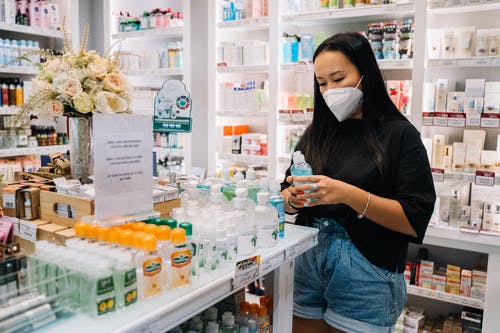Are you in need of medical supplies but don’t know where to buy them? Have you just established your clinic or pharmacy and need to stock up? Are you aware of the role of retail lead?
“Then you need the services of a retail lead,” advised Yostus Hanna. A retail lead will introduce you to the right medical supplies and apparatus for you to get started. Yostus Hanna is a medical field manager and retail lead at L’Oréal with more than 5 years of working experience.
Who is a Retail Lead?
A retail lead is a marketing professional whose job is to advertise and sell products to prospective customers. Retail leads are also called sales reps.
A medical retail lead sells medical goods and provides sales services to customers.
A medical retail lead isn’t just a marketer and trader, but an important part of the medical community.
It’s difficult to be a medical sales rep especially when you have to sell medical supplies in the hospital. You have to be a talented, experienced sales personnel to make sales in the hospital.
These are what you should know about being a sales personnel. They sell prescribed medications and health devices to licensed healthcare workers like nurses and doctors.
Roles of a Retail Lead in the Health Industry
Most times, the focus is on a specific supply of therapeutic medicines meant for diabetic patients or cancer patients.
The sales might cover different locations and the duties involved are:
- Scheduling meetings with old and possibly new customers.
- Showing the medical supplies to medical professionals and customers.
- Persuade the customers to purchase your organization’s products
- Making further services available.
- Recording clients’ purchase information and sales made.
- Coordinating and going to medical seminars.
- Noting clients’ requirements and informing the main office about it.
- Achieving the sales quotas.
- Being updated about the newest clinical information, to having extensive health-related discussions with medical personnel.
Working Hours of a Medical Sales Personnel
The work is done either in the office or remotely. Most work will be carried out by seeing customers on the road and traveling for seminars. Some might even visit customers in their places. Having a driver’s license will give a retailer an edge.
The company engages professional recruiters to advertise available job positions in newspapers, websites, and other outlets.
There is room to advance to other positions like a product manager or regional manager. The catch is that the salesperson must excel in selling goods although competition is higher at senior levels.
There can be work opportunities for sales personnel outside the country because some medical companies have foreign branches.
Educational Requirements of Medical Retailers
Medical sales require nursing experience, a certificate in biomedical science, and other related courses. A retailer may also have a good retail record.
Some companies like training degree holders although not all work requires a degree in science. The prospective employee must be willing to extensively learn on the go about the medical field. Having an A-level in biological sciences will be of great assistance to the job.
Required Skills in Medical Retails
The following skills are needed to be qualified as medical retail personnel:
- Zeal, and the ability to take initiative
- Excellent communication skills
- Great negotiating and selling skills
- Excellent relations and inter-personal skills
- Great coordinating skills
- Good analytical and critical thinking skills are needed to analyze medical data.
- The ability to adapt to constant dynamics in the medical sector.
- Being outspoken and having tactical ways of handling things
- Knowledge of the business world
- Endurance
- Public speaking skills
- Skills in Researching
- Negotiating and integrative ability
- Patience
- Excellent Relation skills
- Coordinating abilities
- Commercial knowledge
Duties of A Medical Retailer
The way organizations handle their retail group is different. The duties of healthcare retail workers differ from one company to the other.
A medical retail lead sells clinical devices, goods and renders services to medical practitioners.
The duties are extensive, but some of them are:
- Receiving sudden calls and possible visitations
- Setting meetings with clinic workers and managements
- Creating good relations with health workers.
- Enlightening health workers on the usefulness of health tools.
- Ensuring the clients within a specific region are well managed.
- Demonstrate goods and help for people.
- Gathering, sorting, and analyzing research data to help in strategic planning and actions.
- Increasing profit of extra goods through upselling.
- Good relations with all teams (Marketing, Customer care, retails) to enable better client service.
- Fixing meetings with medical workers in the community, and in the clinic.
- Actualizing new ideas into businesses.
- Taking up further studies about the field.
- Closing contract deals
- Keep up to date record
- Controlling the costs
- Showing medical workers how goods or tools are used.
- A retail lead has to meet the medical and financial needs of medical practitioners.
- Attend and organize trade fairs, seminars, and workshops.
- Promote and sell the firm’s medical stocks or appliances.
- Formulate marketing strategies
- Market and sometimes manage the products to the best of his or her ability.
Who Patronizes a Retail Lead?
Most people in the health sector patronize a retail lead. Nurses, pharmaceutical centers, medical doctors, and many more. The retailer represents the product manufacturer and draws attention to the products. A retail lead has been trained to have comprehensive answers to questions. He advises his customers about the nature of the product and subtly markets new products.
Conclusion
The medical field is not complete without retail leads because it depends on them for medical supplies and apparatus.
According to Yostus Hanna, a good retail lead will improve your reputation as a good medical practitioner in the medical field.





